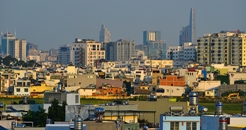 Innovation by the community for the community
Innovation by the community for the community
From an article in the The Conversation
Research by King's College about community innovation in Vietnam during the Covid-19 pandemic has produced some good news stories.
Vietnam has had very low infection rates during two waves of Covid-19. Throughout the first and second waves, Vietnamese business people and ordinary citizens have been coming up with innovative ways to respond to the pandemic. The research project focused on Vietnamese inclusive innovation – meaning innovation that helps the community in some way, with a focus on sharing the benefits with a wide range of people from different socio-economic backgrounds.
During both waves, grassroots innovators and socially minded entrepreneurs have helped to soften the blow of the pandemic. Inclusive innovation has meant that society’s most vulnerable have had access to sustenance, testing, tracing and treatment throughout the crisis.
Some pandemic innovations have been aimed at preventing further infections. In the centre of the outbreak, Danang, local tech startup BusMap has worked with the authorities to create an infection map to help locals avoid hotspots and to find the nearest medical facility.
Meanwhile, newly designed robots have been given the job of disinfecting hospitals and public spaces, with different models developed by a military hospital in Saigon, students at a private university in Hanoi and students at a public university in Saigon.
Various automatic hand-sanitiser dispensers have been assembled by school students around the country, using commercially available parts. On being discharged from hospital, one covid-19 patient gathered his friends to produce disinfectant and sanitising booths, which he donated to hospitals, including the one that had treated him.
In the early days of the outbreak, the Ghen Co Vy, or Washing Hand Song, composed by local musicians in collaboration with the Ministry of Health went viral around the world for its quirky message and dedicated choreography. Since then, ordinary people have written their own COVID-19 songs, reminding people to take precautionary measures.
While the above interventions were mainly dedicated to prevention and control, another group of innovators has focused on alleviating the negative social impact of COVID-19.
A famous baker in Saigon by the name of Kao Sieu Luc has used dragon fruit to make bread, sharing his recipe with the country. His intent is to help dragon fruit farmers who cannot export their crops due to Vietnam’s strict travel restrictions. The recipe has been taken up not only by ordinary people but also by other businesses, resulting in the creation of a KFC dragon fruit burger.
In Hanoi, doctor Khuat Thi Hai Oanh has set up a charity called An Egg A Day to provide food, masks and essential goods for the homeless and extremely poor families throughout northern Vietnam. The charity also helps people in need to find work and accommodation, and it subsidises their rent.
Saigon businessman Hoang Tuan Anh has built a mask ATM for his community during the second wave. The machine dispenses free, individually wrapped masks, with a remote operator to ensure fair distribution and to remind recipients to wash their hands before touching the dispenser.
During the first wave, Hoang set up the first rice ATM in front of his office. The ATM provides free 1.5kg of rice and was reported to have dispensed 5 tonnes of rice in its first two days. Hoang’s rice and mask dispensers have been replicated by entrepreneurs and charities across the country.
The focus of the innovators and social entrepreneurs interviewed has shifted to stop the spread of the virus or to alleviate the social impact of lockdowns.
Over the past seven months, the researchers been struck by the range and speed of innovations, and awestruck by the people and companies who are working for the greater good. Each interview conducted in Vietnam reminds humanity’s virtues. These heartening examples of solidarity can help us all get through this crisis.
Read the full article here.
Retweet about this article:
From an article in the The Conversation, 11/11/2020